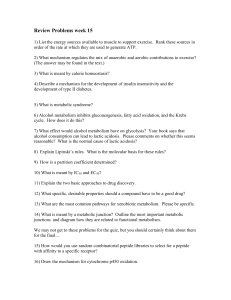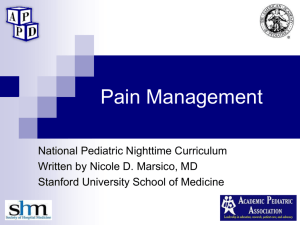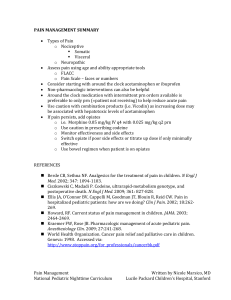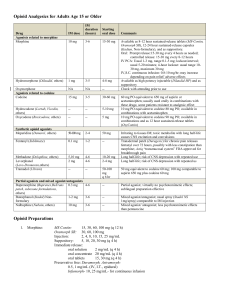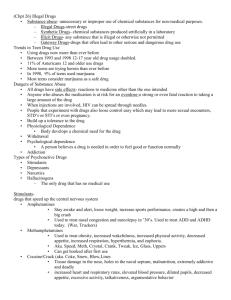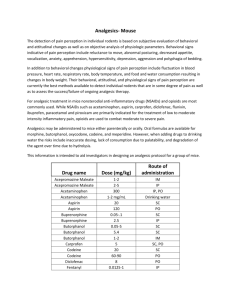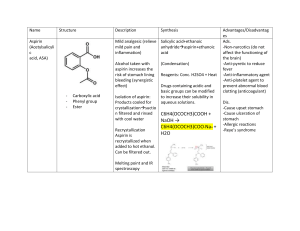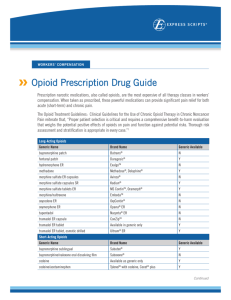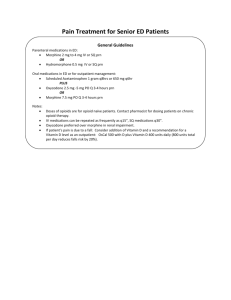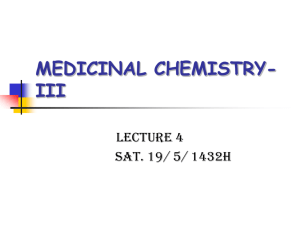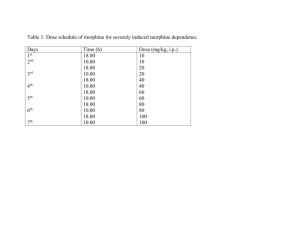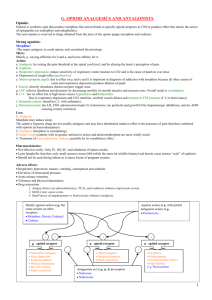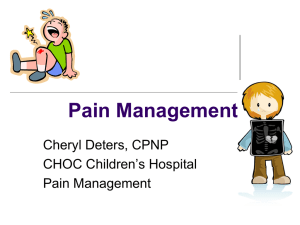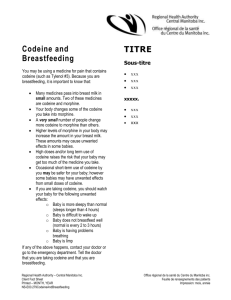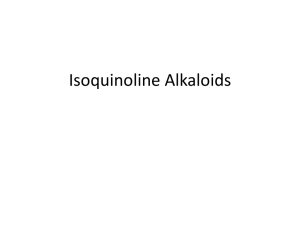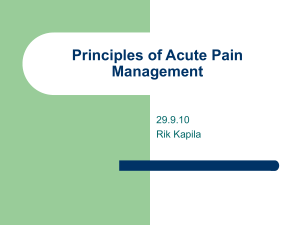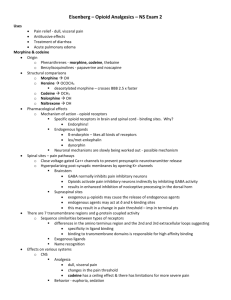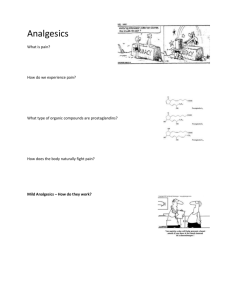PAIN MANAGEMENT PRE
advertisement
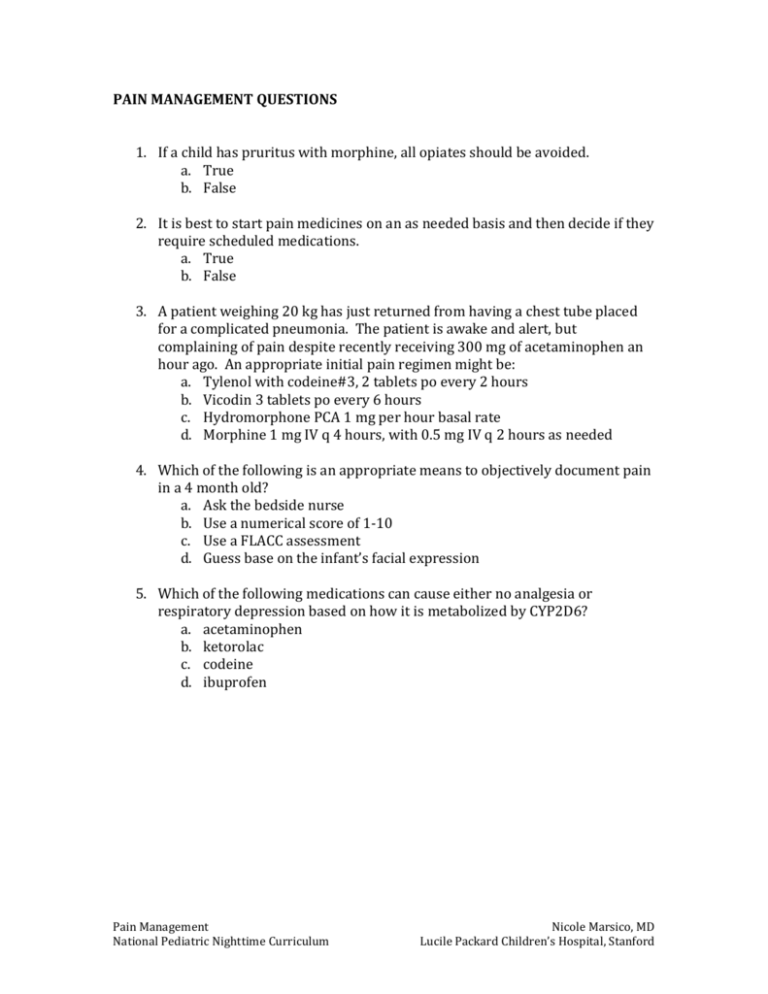
PAIN MANAGEMENT QUESTIONS 1. If a child has pruritus with morphine, all opiates should be avoided. a. True b. False 2. It is best to start pain medicines on an as needed basis and then decide if they require scheduled medications. a. True b. False 3. A patient weighing 20 kg has just returned from having a chest tube placed for a complicated pneumonia. The patient is awake and alert, but complaining of pain despite recently receiving 300 mg of acetaminophen an hour ago. An appropriate initial pain regimen might be: a. Tylenol with codeine#3, 2 tablets po every 2 hours b. Vicodin 3 tablets po every 6 hours c. Hydromorphone PCA 1 mg per hour basal rate d. Morphine 1 mg IV q 4 hours, with 0.5 mg IV q 2 hours as needed 4. Which of the following is an appropriate means to objectively document pain in a 4 month old? a. Ask the bedside nurse b. Use a numerical score of 1-10 c. Use a FLACC assessment d. Guess base on the infant’s facial expression 5. Which of the following medications can cause either no analgesia or respiratory depression based on how it is metabolized by CYP2D6? a. acetaminophen b. ketorolac c. codeine d. ibuprofen Pain Management National Pediatric Nighttime Curriculum Nicole Marsico, MD Lucile Packard Children’s Hospital, Stanford PAIN MANAGEMENT ANSWERS 1. If a child has pruritus with morphine, all opiates should be avoided. a. True b. False Answer: B. Opiate side effect profiles vary significantly. If the side effects of one (i.e. pruritus, over sedation) are not beneficial, it is reasonable to try another type. 2. It is best to start pain medicines on an as needed basis and then decide if they require scheduled medications. a. True b. False Answer: B. If a child has pain, it is preferable to begin with a standing pain regimen appropriate to the level and type of pain. For instance, you may start with scheduled acetaminophen or ibuprofen. 3. A patient weighing 20 kg has just returned from having a chest tube placed for a complicated pneumonia. The patient is awake and alert, but complaining of pain despite recently receiving 300 mg of acetaminophen an hour ago. An appropriate initial pain regimen might be: a. b. c. d. Tylenol with codeine#3, 2 tablets po every 2 hours Vicodin 3 tablets po every 6 hours Hydromorphone PCA 1 mg per hour basal rate Morphine 1 mg IV q 4 hours, with 0.5 mg IV q 2 hours as needed Answer: D. In opiate naïve children who have recently had a painful procedure (chest tubes can be very painful), starting with a low dose (0.05 mg/kg) of morphine around the clock is reasonable. It will be important to closely monitor this patient by checking in after the dose of morphine to see how the patient responded (i.e. Too drowsy? Pain not affected? Nausea?). In general, combined medications are reserved for patients with more established pain needs. When initiating a pain management plan, it is easier to start with single agents. PCAs can be very helpful, but in this case it may be dangerous to start with a continuous infusion without knowing how the patient will respond to the narcotic. Pain Management National Pediatric Nighttime Curriculum Nicole Marsico, MD Lucile Packard Children’s Hospital, Stanford PAIN MANAGEMENT ANSWERS CONTINUED 4. Which of the following is an appropriate means to objectively document pain in a 4 month old? a. Ask the bedside nurse b. Use a numerical score of 1-10 c. Use a FLACC assessment d. Guess base on the infant’s facial expression Answer: C. The FLACC (Faces, Legs, Activity, Crying, Consolability) is a means of objectively documenting an infant’s pain based on non-verbal cues. 5. Which of the following medications can cause either no analgesia or respiratory depression based on how it is metabolized by CYP2D6? a. acetaminophen b. ketorolac c. codeine d. ibuprofen Answer: C. Codeine is metabolized to morphine in the liver. Due to variability in the CYP 2D6 enzyme, codeine can have varying clinical effects. About 10% of Caucasian children are poor metabolizers and get no analgesic effect. About 40% of children of North African descent and 3% of Caucasians are ultra-rapid metabolizers and have morphine accumulation and even death after receiving standard doses. Pain Management National Pediatric Nighttime Curriculum Nicole Marsico, MD Lucile Packard Children’s Hospital, Stanford
